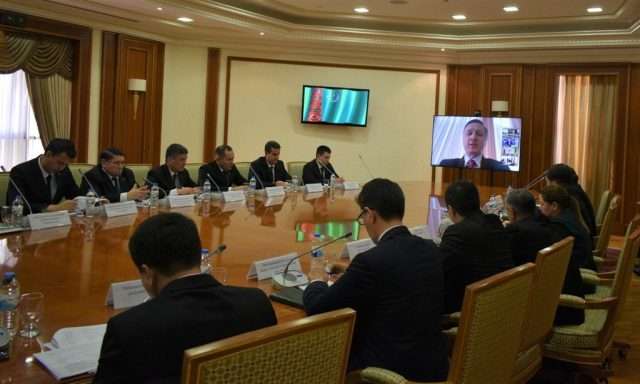
Turkmenistan and Tatarstan aim to increase their economic cooperation and trade turnover and create a favourable environment to support joint projects, investments, and economic development. Tatarstan foreign policy in Central Asia is becoming more active and supporting Moscow’s regional strategy.
On January 27th, 2022, the Minister of Finance and Economy of the Republic of Turkmenistan, Serdar Serdarov, and the Deputy Prime Minister – Minister of Industry and Trade of the Republic of Tatarstan, Albert Karimov, took part via videoconference together with Turkmen and Tatarstan representatives met in the seventh meeting of the Joint Turkmen-Tatarstan Working Group on trade, economic, scientific, technical, and cultural cooperation.
The parties discussed several issues for the further development of bilateral partnership between Turkmenistan and Tatarstan and the implementation of those agreements reached during previous meetings of the Working Group. Both the participants from the Turkmen and Tatarstan sides stressed that there is considerable potential for expanding trade and economic cooperation between the two countries, stressing the importance of intensifying trade and economic relations by increasing foreign trade turnover, creating favourable conditions for the interaction of economic entities, as well as the joint implementation of mutually beneficial projects.
During the videoconference, the participants highlighted the positive experience of effective long-term partnership in the oil and gas sector and the industry field and the enormous existing potential for its expansion. At the same time, the parties stressed their readiness to continue work to strengthen close contacts between Turkmen and Tatarstan enterprises and companies in various sectors of the oil and gas and industrial sectors.
In addition, both the Turkmen and Tatarstan representatives noted several issues of close cooperation between the parties in communications and information technologies, agriculture and environmental protection, science and education, culture, sports and youth policy.
Geopolitical scenario
- Turkmenistan needs to diversify its economy and foreign partners and find markets to export its natural gas. Turkmenistan is rich in energy sources and needs a stable regional market and different partners to export its natural gas and support its economic development. In this framework, Ashgabat is promoting various export strategists and economic partnerships with regional actors:
- Turkmenistan reached an agreement with Azerbaijan to jointly explore the hydrocarbon field known as Dostluk or Dostlug (‘friendship’ in their respective languages) located in the Caspian Sea.
- Turkmen authorities promote a Caspian interconnector to export their natural gas to Azerbaijan and, consequently, to the European market, supporting the EU Energy Security Strategy and Brussels’ attempt to diversify its gas imports and reduce the dependence on Russian gas.
- Ashgabat organised a consistent marketing strategy to promote the Turkmenistan-Afghanistan-Pakistan-India (TAPI) natural gas pipeline to export Turkmen gas to the east.
- Turkmenistan is in constant dialogue with Beijing to strengthen cooperation in the gas field and increase Turkmen gas exports to the Chinese market.
- Ashgabat continues its partnership and economic cooperation with the Russian Federation sharing with Moscow the maritime borders in the Caspian Sea and a common cultural and political background linked to the recent Soviet past.
- Tatarstan has been conducting a foreign and economic policy to strengthen relations with Central Asian and Middle Eastern countries. Tatarstan is one of the most economically developed republics in the Russian Federation, located in a large industrial region crossing important highways. The area is rich in natural resources, robust and diversified industry, intellectual potential and qualified human resources. Among the industries operating in Tatarstan, the oil-gas-chemical complex is one of the most active thanks to the state company Tatneft which operates in Russia and abroad. Thanks to its economic performance and activities in the energy market, Tatarstan plays a significant role in promoting Russian foreign policy abroad by reaching cooperation agreements with Middle Eastern and Central Asian countries (Tatarstan’s role in Kyrgyz economic diversification and investments attraction, Geopolitical Report Vol.13 Issue 8; The Middle Eastern expansion of Tatneft, Geopolitical Report Vol. 11 Issue 2). In Central Asia, mainly, Tatarstan might also use the cultural card based on Islam and the Tatar language, which belongs to the Turkic-speaking family.
Why does it matter?
- Stronger economic cooperation between Turkmenistan and Tatarstan favours the Russian regional strategy. As the Republic of Chechnya in the North Caucasus, also the Republic of Tatarstan might be considered Moscow’s strategic tool to promote its presence and influence in the blizhnee zarubezhe (near abroad), the Middle East and the Arab-Muslim world, particularly in those countries and region rich in gas and natural gas and located at the centre of transport routes.
- Tatarstan’s companies and specialists in the Turkmen market might counterbalance the Chinese financial strategy and Western FDIs in the country. Undeniably, the United States and European Union are interested in Turkmen natural gas exports to counter the Russian strength in the Eurasian energy market. China has always been looking for commercial partners to support its Belt and Road Initiative and energy imports.
